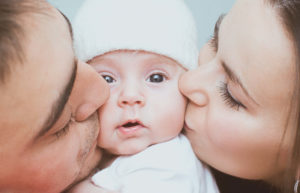Every person and likewise every child has their own personal sleep rhythm. But while adults can estimate their sleep needs relatively well, newborns, in particular, do not yet have a day-night sense in the first few weeks. Unfortunately, the possibilities for parents to influence this rhythm are quite meager.
Of course, moms and dads can support their child in its development – but the effectiveness of their efforts is initially determined by the child. However, while some babies have a kind of inner urge for regularity, others need help from mom and da to satisfy their nutritional and sleep needs. A calm and constant daily routine with fixed mealtimes, bedtimes, bath times and other rituals is of fundamental importance, as this has a calming effect on the child. However, parents need to be careful not to put their child at a disadvantage in the long term condition. The following advice should help you to do everything right when it comes to baby sleep.
Table of contents
1. How Much Sleep Does My Newborn Need?
After birth, every infant initially retains its sleep rhythm from the womb – that is, day and night do not matter to it per se. In the first few weeks of life, a baby will sleep on average up to about 18 hours a day (some need 20, others only 13) – usually in 4-hour segments. Don’t worry, once your baby is three months old, you’ll be able to teach him or her asleep routine and bedtime rituals. It is therefore advisable to introduce fixed sleep times for the evening and for daytime naps from the third or fourth month of life because the newborn is now gradually learning to distinguish between day and night. The individual sleep periods and the baby’s waking phases also gradually become longer. By the time your baby is six months old, he or she can usually sleep through the night. From this point on, fixed sleeping and eating times should already have been firmly established and fit the baby’s sleep needs. Good to know: At six to twelve months, most babies sleep a total of about 14 hours.
2. How Do I Improve My Infant’s Sleep?

In this way, he or she will enjoy going to bed in the long term and will be able to fall asleep more easily.
At night from the age of six months. Parents should therefore feed their baby in such a way that he or she can manage without food at night if possible. Otherwise, your child will wake up at night waiting for food.
Can also lead to a sensory overload.
You will find typical bedtime rituals.
And fall asleep on their own. The fact is babies often only whine for a short time, but if a child really cries himself to sleep, he will of course hardly fall asleep – except exhaustion.
Is usually a good solution for difficulties sleeping through the night.
Tip And Explanation
The Power Of Movement
The movement reminds babies of the womb – that’s why newborns like it so much when they are rocked. The best way to do this is with a rocker from babywippe.net. But there are also other ways to create sleep signals. For example, you can carry the baby around or drive it around.
The Right Attitude
Convey to your child that going to bed is something beautiful and does not have to have a forced character. No food at night. Most children can manage without a bottle or breastfeeding
Caution Conditioning
If the infant always falls asleep while bottle-feeding or breastfeeding, he automatically learns to associate this with falling asleep. It is therefore advisable to refrain from this habit as often as possible before going to bed. This way, the chances are good that the child will learn to fall asleep without sucking.
Protection Against Sensory Overload
It is particularly helpful for restless children if their daily routine is calmer from the afternoon onwards. This also means that no electronic devices should be used for two hours before bedtime, as they emit blue light and thus impair the release of the sleep-promoting neurohormone melatonin. Also beware of sensory overload from spinning, noisy toys by the crib. These keep the baby awake.
Establish Rituals
Especially in the evening, you should introduce special rituals for falling asleep. These should start after dinner time with actions that are always performed in the same sequence. In this way, you signal to the child’s inner clock that it is time to sleep. Here. Encourage self-soothing. Children need to learn to calm down
Babies recognize stress
Your baby can sense when you are not relaxed. So consciously use breastfeeding or feeding times for your own regeneration. You should also take advantage of all the help you can get and lower your own expectations.
Create Daily Structure
Regular bedtimes and daytime sleep times remain out of the question. Especially important: a fixed time to get up. A shorter daytime sleep.
The Right Environment
Let your little one take his naps in a bright room with normal background noise! At night, however, avoid a lot of light or a lot of words.
[caption id="attachment_7091" align="aligncenter" width="374"]

Regardless of how old your child is, the signs of tiredness are similar. Kids get restless, yawn, or rub their eyes. Be careful not to cross this fatigue point! If it’s missed, your child is sure to rev up before he or she can find rest again. Here’s a checklist to see if you should change anything about your baby’s sleeping habits.
3. How Should My Child Be Dressed At Night?
Many parents tend to dress their children too thick rather than too thin. Caution is advised here: If the child is too cold, you can be sure that he will complain loudly. However, if the little one is too warm, he or she will usually just continue to sleep, which creates the risk of overheating and can lead to a dangerous buildup of heat. Excessive heat can quickly become unbearable for a newborn, as sweating is still barely developed. Hyperthermia is considered by doctors to be a significant safety risk for babies under one year of age. Watch out for it! Furthermore, the ideal room temperature for newborns and infants to sleep in is between 16 and 18 degrees Celsius. Accordingly, you should also adopt the baby’s nightwear to the different sleeping temperatures!









4 thoughts on “10 Tips for Baby Sleep – Promoting Restful Hours the Right Way”